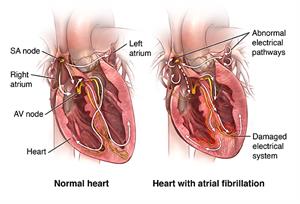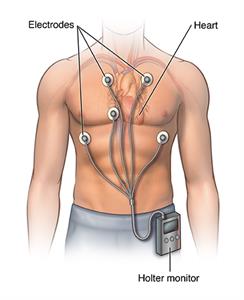Atrial Fibrillation
What is atrial fibrillation?
Atrial fibrillation, or Afib, is a kind of abnormal heart rhythm or arrhythmia.
Normally, a group of cells begin the signal to start your heartbeat. During Afib, the signal to start the heartbeat is disorganized. This causes the atria to quiver or “fibrillate” and the ventricle to contract irregularly and sometimes quickly. The contraction of the atria and the ventricles is no longer coordinated, and the amount of blood pumped out to the body will vary with each heartbeat. The ventricles may not be able to pump blood efficiently to the body.
 The quivering atria can lead to blood pooling. This increases the risk of forming blood clots. These clots can then travel to the brain, causing a stroke. This is why Afib significantly increases the risk for stroke.
The quivering atria can lead to blood pooling. This increases the risk of forming blood clots. These clots can then travel to the brain, causing a stroke. This is why Afib significantly increases the risk for stroke.
Causes of atrial fibrillation
Afib can happen from any type of problem that changes the way the heart handles electricity. Sometimes the cause is unknown. There is a range of things that can increase this risk, including:
- Age (especially older than age 65)
- High blood pressure
- Coronary artery disease
- Heart failure
- Rheumatic heart disease (from previous streptococcus infection)
- Heart valve defects (like mitral valve prolapse)
- Pericarditis
- Congenital heart defects
- Sick sinus syndrome
- Hyperthyroidism
- Obesity
- Diabetes
- Lung disease
- Obstructive sleep apnea
- Metabolic syndrome
- High-dose steroid therapy
Afib is also more likely to happen during an infection or right after surgery. Stress, caffeine and alcohol may also set off attacks.
People who do vigorous endurance exercises, such as running marathons, can develop Afib.
Certain people may be at greater risk of developing Afib due to differences in genes they inherited from their parents. This is not yet fully understood, however.
Symptoms of atrial fibrillation
Afib can cause different symptoms. This is especially true when it is not treated. Sometimes Afib has no symptoms at all. Symptoms include:
- Heart palpitations — it might feel like your heart is skipping beats or beating too hard
- Shortness of breath
- Chest pain
- Dizziness or fainting
- Weakness and fatigue
- Confusion
- Swelling in the feet, ankles and legs
Treatment of atrial fibrillation
Your health care provider will work with you to create a personalized treatment strategy, according to your medical history, your symptoms and your preferences. Some people who don’t have any symptoms may not need a large amount of treatment. Some general categories of treatment include:

- Anticoagulation medicines (blood thinners) or aspirin, to help prevent stroke
- Non-medication options to reduce stroke
- Medicines to slow the heartbeat, like beta-blockers and calcium channel blockers
- Medicines to help prevent Afib (antiarrhythmics)
- Treatment for the main cause of Afib, if known
- Medicines to treat heart failure (if present), like ACE inhibitors
You will receive outstanding cardiology care at all our hospitals and physician offices. That makes it convenient for you to get the heart care you need, close to home. If you need more specialized cardiac care, you have access to services at our Heart and Vascular Center, located at our Medical Center in Worcester, MA.